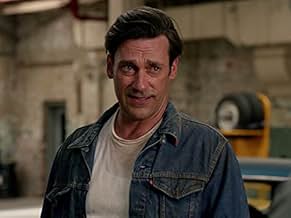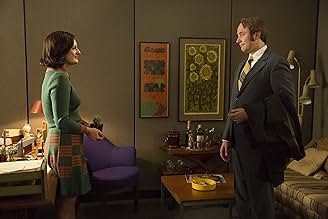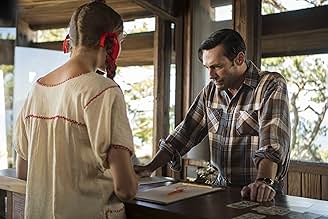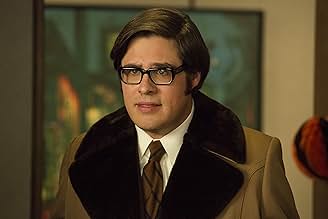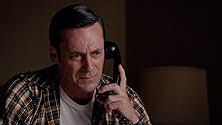Mad Men
- TV Series
- 2007–2015
- Tous publics
- 45m
A drama about one of New York's most prestigious ad agencies at the beginning of the 1960s, focusing on one of the firm's most mysterious but extremely talented ad executives, Donald Draper.A drama about one of New York's most prestigious ad agencies at the beginning of the 1960s, focusing on one of the firm's most mysterious but extremely talented ad executives, Donald Draper.A drama about one of New York's most prestigious ad agencies at the beginning of the 1960s, focusing on one of the firm's most mysterious but extremely talented ad executives, Donald Draper.
- Won 16 Primetime Emmys
- 166 wins & 450 nominations total
Browse episodes
Summary
Reviewers say 'Mad Men' is lauded for its deep character studies, historical accuracy, and nuanced depiction of the 1960s, focusing on the advertising industry. The show delves into themes of identity, power, and societal change, with standout performances, especially Jon Hamm as Don Draper. Its meticulous period detail receives high praise. However, some viewers critique the slow pacing, repetitive storylines, and occasional frustration with character exits and unresolved plotlines.
Featured reviews
I'll be the first to admit that Mad Men is a show about watching people go to work and live their lives. It should be dull and uninteresting, yet somehow it managed to grip me for a whole 7 seasons and left me wanting more.
The setting is a big part of it. The historical interest of the time (JFK's assassination, the moon landing, England winning the World Cup, to name a few key points in the show) is enough to keep many gripped. It's more than that though. The characters in themselves are worth following and you get invested in them as the seasons progress.
To be frank I didn't like the first season. I just didn't get the formula and was getting close to giving up on the show. I'm glad I didn't though as it only improves from the second season onward.
The setting is a big part of it. The historical interest of the time (JFK's assassination, the moon landing, England winning the World Cup, to name a few key points in the show) is enough to keep many gripped. It's more than that though. The characters in themselves are worth following and you get invested in them as the seasons progress.
To be frank I didn't like the first season. I just didn't get the formula and was getting close to giving up on the show. I'm glad I didn't though as it only improves from the second season onward.
Everyone has a back burner watchlist of TV shows considered to be the greatest. These are often graced by the likes of Breaking Bad, Deadwood, The Wire, The Sopranos, and, of course, Mad Men. Even though these shows may be indeed great, you may be familiar with a weird avoidance mechanism that usually kicks in: we may regard those landmark pieces of TV not very exciting, especially if they are a few years old - not unlike "must-read" literary classics that nobody ever reads - and thus we relegate them to the bottom of our watchlists, while we consume the latest, more exciting, and often less fulfilling offers.
Then, when you finally make the effort to watch that landmark series and realize it is every bit as good as everyone said it was, you flagellate yourself thinking why you held back for so long.
This Great-TV-Show-Avoidance-Mechanism happened to me in regards to Mad Men. A show about advertising and corporate people did not seem very exciting to me, and I wasn't really a fan of anyone in the cast (save Elizabeth Olson). Having in the past started to watch best-of-all-time TV shows just to drop them along the way - I'm looking at you, The Sopranos - I kept it on the back burner for a very long time. Now, after consuming all of Mad Men in a relatively short amount of time, I think it is the most consistently good TV show I have ever watched.
Out of the 92 episodes in the entire series on IMDb, I have rated only two a 7. All the rest got a rating of either 8 or 9 (I don't believe in perfection, so 9 is as high as I go). The key word here, alongside consistency, is even-handedness. Even though there are standout episodes, usually popping out unpredictably within seasons, rather than near the end like most other shows, Mad Men's episodes are so well balanced in terms of drama, character development and plot advancement that you feel you are witnessing interesting lives go by - extremely well costumed, photographed, written and acted lives, but fictional nonetheless. Compared to most other shows, there is a refreshing under-reliance on plot twists and melodramatic acting scenes, which now seem to me like the bluntest tools in the writer's bag of tricks to keep viewers tuning in every week. Perhaps Mad Men's greatest achievement is just that: through the power of character and acting alone, it manages to capture the viewers' interest while dispensing with more traditional tricks of storytelling. Of course, other facets of the production, such as the attention to period detail, costume design and cinematography are really good too. But what stands out and keeps us watching is the near-perfect marriage between solid writing, first, and solid acting, second - acting here defined in terms of how perfectly the actors inhabit their roles, not the showy, larger-than-life, award-stealing acting scenes you find in Oscar bait films. And I tell you from experience, the binge pull of the series makes it nearly impossible to watch a single episode in a sitting. I have only been able to pull that off once, with the final episode.
The way the plot is handled is simply masterful. For instance, if a character goes on a quest to achieve something, and we spend some time witnessing the build-up to it, it is not guaranteed they will (ever) succeed, or that at least a lesson will be learned at the end of the day. Things may end up just like they are - a lot like real life. The backdrop of US history unfolding is neither overpowering, i.e., stealing attention from the characters or events at hand, or just a side note mentioned without consequence. These historically-inspired scenes excel in revealing interesting takes on people's attitudes (secretaries crying over Marilyn Monroe's death, for instance) while providing startling contrasts to our times. Another striking feature of the show I'd like to mention is that, now and again, there are a few scenes with unimportant characters - like a child doing something they ought not to do, feeling guilty, and trying to hide it afterwards - that seem to be there mostly to make us feel, "yes, I have felt this before, this is familiar to me". Those "snippets of reality," as I call them, serve no narrative purpose whatsoever and don't even advance our understanding of the characters, but they do a great deal to establish the mood and reinforce our connection to the characters, even if indirectly. By including these moments in small amounts and in the right moment, the writers are still able to keep everything on track while disregarding the common writing advice that every scene should either advance the plot or deepen character development (or better yet, both at the same time). By the way, I have rarely seen such "extraneous" scenes elsewhere, and when they do appear, they are due mostly to an editor or writer's incompetence rather than to the command of their craft.
On top of all that, the show is also a wonderfully honest piece of television. It does not promise or deliver anything more than what you see on screen. After a couple of seasons, you are likely to be able to predict to a high degree of accuracy how it is all going to end - Mad Men operates within such a well thought out "narrative system", with clearly defined bounds, that you know exactly what NOT to expect. The way the series finale begins and ends makes you feel like you are watching just another episode and, miraculously, still manages to satisfy.
In closing, I should note that Mad Men does not provide the blockbuster-y thrills of, say, Game Thrones before it became a catastrophic failure, Westworld in its first season, or Breaking Bad during the Gus Fring phase. Above all, it shows that it is entirely possible to make great, often magnificent, television without any sort of sensationalized acting, clichéd dialogue or narrative acrobatics. I have already completely forgotten Game of Thrones and don't plan on rewatching any time soon. I find it unlikely I will ever do the same to Mad Men.
Then, when you finally make the effort to watch that landmark series and realize it is every bit as good as everyone said it was, you flagellate yourself thinking why you held back for so long.
This Great-TV-Show-Avoidance-Mechanism happened to me in regards to Mad Men. A show about advertising and corporate people did not seem very exciting to me, and I wasn't really a fan of anyone in the cast (save Elizabeth Olson). Having in the past started to watch best-of-all-time TV shows just to drop them along the way - I'm looking at you, The Sopranos - I kept it on the back burner for a very long time. Now, after consuming all of Mad Men in a relatively short amount of time, I think it is the most consistently good TV show I have ever watched.
Out of the 92 episodes in the entire series on IMDb, I have rated only two a 7. All the rest got a rating of either 8 or 9 (I don't believe in perfection, so 9 is as high as I go). The key word here, alongside consistency, is even-handedness. Even though there are standout episodes, usually popping out unpredictably within seasons, rather than near the end like most other shows, Mad Men's episodes are so well balanced in terms of drama, character development and plot advancement that you feel you are witnessing interesting lives go by - extremely well costumed, photographed, written and acted lives, but fictional nonetheless. Compared to most other shows, there is a refreshing under-reliance on plot twists and melodramatic acting scenes, which now seem to me like the bluntest tools in the writer's bag of tricks to keep viewers tuning in every week. Perhaps Mad Men's greatest achievement is just that: through the power of character and acting alone, it manages to capture the viewers' interest while dispensing with more traditional tricks of storytelling. Of course, other facets of the production, such as the attention to period detail, costume design and cinematography are really good too. But what stands out and keeps us watching is the near-perfect marriage between solid writing, first, and solid acting, second - acting here defined in terms of how perfectly the actors inhabit their roles, not the showy, larger-than-life, award-stealing acting scenes you find in Oscar bait films. And I tell you from experience, the binge pull of the series makes it nearly impossible to watch a single episode in a sitting. I have only been able to pull that off once, with the final episode.
The way the plot is handled is simply masterful. For instance, if a character goes on a quest to achieve something, and we spend some time witnessing the build-up to it, it is not guaranteed they will (ever) succeed, or that at least a lesson will be learned at the end of the day. Things may end up just like they are - a lot like real life. The backdrop of US history unfolding is neither overpowering, i.e., stealing attention from the characters or events at hand, or just a side note mentioned without consequence. These historically-inspired scenes excel in revealing interesting takes on people's attitudes (secretaries crying over Marilyn Monroe's death, for instance) while providing startling contrasts to our times. Another striking feature of the show I'd like to mention is that, now and again, there are a few scenes with unimportant characters - like a child doing something they ought not to do, feeling guilty, and trying to hide it afterwards - that seem to be there mostly to make us feel, "yes, I have felt this before, this is familiar to me". Those "snippets of reality," as I call them, serve no narrative purpose whatsoever and don't even advance our understanding of the characters, but they do a great deal to establish the mood and reinforce our connection to the characters, even if indirectly. By including these moments in small amounts and in the right moment, the writers are still able to keep everything on track while disregarding the common writing advice that every scene should either advance the plot or deepen character development (or better yet, both at the same time). By the way, I have rarely seen such "extraneous" scenes elsewhere, and when they do appear, they are due mostly to an editor or writer's incompetence rather than to the command of their craft.
On top of all that, the show is also a wonderfully honest piece of television. It does not promise or deliver anything more than what you see on screen. After a couple of seasons, you are likely to be able to predict to a high degree of accuracy how it is all going to end - Mad Men operates within such a well thought out "narrative system", with clearly defined bounds, that you know exactly what NOT to expect. The way the series finale begins and ends makes you feel like you are watching just another episode and, miraculously, still manages to satisfy.
In closing, I should note that Mad Men does not provide the blockbuster-y thrills of, say, Game Thrones before it became a catastrophic failure, Westworld in its first season, or Breaking Bad during the Gus Fring phase. Above all, it shows that it is entirely possible to make great, often magnificent, television without any sort of sensationalized acting, clichéd dialogue or narrative acrobatics. I have already completely forgotten Game of Thrones and don't plan on rewatching any time soon. I find it unlikely I will ever do the same to Mad Men.
10alexnapo
When I started watching Mad Men, the rhythm of it felt slow.
Pretty quickly did I realize how much more powerful the slow story & plot development rhythm would be, allowing us to discover the characters, mostly in seasons 1 and 2, and then really be in the thick of it in subsequent seasons.
Indeed, this series has pushed character development so far that they are the entire and only reason why this series is interesting. The actual events happening at the advertising agency is a pretext to throw more things at those characters and have them deal with it. In fact, the characters are so interesting that there is practically no violence needed (except a few minor events) over 7 seasons to keep this series going. I find that tremendously respectable to be able to craft a series in this way, not using gun shots and bombs to make it lively.
Finally, I have not lived in the early 60's time period the series is set in, but I can only say that it's all seemed to me very interesting and all these "vintinge" props and costumes, hair style and such made it all the more fascinating to watch.
Absolutely great work.
Pretty quickly did I realize how much more powerful the slow story & plot development rhythm would be, allowing us to discover the characters, mostly in seasons 1 and 2, and then really be in the thick of it in subsequent seasons.
Indeed, this series has pushed character development so far that they are the entire and only reason why this series is interesting. The actual events happening at the advertising agency is a pretext to throw more things at those characters and have them deal with it. In fact, the characters are so interesting that there is practically no violence needed (except a few minor events) over 7 seasons to keep this series going. I find that tremendously respectable to be able to craft a series in this way, not using gun shots and bombs to make it lively.
Finally, I have not lived in the early 60's time period the series is set in, but I can only say that it's all seemed to me very interesting and all these "vintinge" props and costumes, hair style and such made it all the more fascinating to watch.
Absolutely great work.
The brilliance is all in the subtext. There are many hilarious moments that are only funny if you've been paying attention and understand where the character is coming from. There are also many tragic moments that would pass you by if you didn't know what came before. Many lines have double or even triple meanings. Watch this from the beginning, with a friend. Believe me, you will want to discuss each episode afterward to figure out some of the nuances of what happened.
The main Mad Man is the confident womanizer Don Draper, who is head of the Creative department at a mid-sized ad agency in 1960s Madison Avenue. I admit, at first I kind of hated him, but as the viewer learns more about him and his past, I learned to - not love him exactly - but like him and want to watch him endlessly. He is a complicated character who can be a very good man, but also a very bad man.
Don Draper is joined by a rich cast of supporting characters, many of whom deserve a show of their own: The ambitious young Campbell who is utterly sleazy most of the time, but has occasional moments of growth and even cuteness.Peggy Olson starts out as Draper's secretary, but her growth into a strong, confident woman mirrors what is happening for Woman in the 60's. Silver fox Stirling - he may be morally bankrupt but gets some of the best lines. I could go on . . .
The 60's clothes, hairstyles, decor, and current events provide an interesting backdrop for what is essentially a character piece. The setting provides both the occasional laugh (cigarettes being advertised as "healthy") and the more than occasional cringe (how could dumping trash from a picnic in the park right on the grass ever seem okay?!).
If you need fast-paced action or a laugh track, this definitely isn't the show for you. But, if you like character development and subtlety in your television shows, rent the first seasons on DVD and settle in. You won't regret it.
The main Mad Man is the confident womanizer Don Draper, who is head of the Creative department at a mid-sized ad agency in 1960s Madison Avenue. I admit, at first I kind of hated him, but as the viewer learns more about him and his past, I learned to - not love him exactly - but like him and want to watch him endlessly. He is a complicated character who can be a very good man, but also a very bad man.
Don Draper is joined by a rich cast of supporting characters, many of whom deserve a show of their own: The ambitious young Campbell who is utterly sleazy most of the time, but has occasional moments of growth and even cuteness.Peggy Olson starts out as Draper's secretary, but her growth into a strong, confident woman mirrors what is happening for Woman in the 60's. Silver fox Stirling - he may be morally bankrupt but gets some of the best lines. I could go on . . .
The 60's clothes, hairstyles, decor, and current events provide an interesting backdrop for what is essentially a character piece. The setting provides both the occasional laugh (cigarettes being advertised as "healthy") and the more than occasional cringe (how could dumping trash from a picnic in the park right on the grass ever seem okay?!).
If you need fast-paced action or a laugh track, this definitely isn't the show for you. But, if you like character development and subtlety in your television shows, rent the first seasons on DVD and settle in. You won't regret it.
This is a perfect show in every sense. The opening credits & animated intro are themselves works of art, and the creative direction makes the series so visually exquisite that you can't take your eyes off the screen even for a moment lest you miss one of the many perfect vignettes. The haunting opening music sets the stage for masterful sound design, ranging from each episode's musical selections to the subtlest of ambient sounds. The camera-work is nothing short of stunning; it loves each character and makes even the background action interesting. Talented cast and every character is watchable & believable.
For a period piece, 'Mad Men' is remarkably fresh. The show is set in 1960, following a decade of post-WWII recovery which, with the help of rampant consumerism, transformed America from an industrial society into a "leisure society". One of the most rewarding things about the show is how we get to witness the many cracks which had already begun to form in the manicured facade of the '50s, slowly making way for America's rebellion against the manufactured "good life", and resulting in the social & political upheaval of the 1960s and 1970s.
We get to have intimate glimpses into the various components of this process--money, power, politics, sex, race, gender roles-- in a way that makes us feel as if we're actually there in the room with the characters. The show also does a magnificent job of portraying the simultaneous liberation and objectification of women as consumerism rapidly transformed their role in society.
Each and every well-developed character on this show takes his/her turn to unfold in delicate layers. This unfolding is done with pin-point precision and subtlety, and without ever spoon-feeding us. And every new nugget of information is a highly relevant piece of this very addictive puzzle.
~NN
For a period piece, 'Mad Men' is remarkably fresh. The show is set in 1960, following a decade of post-WWII recovery which, with the help of rampant consumerism, transformed America from an industrial society into a "leisure society". One of the most rewarding things about the show is how we get to witness the many cracks which had already begun to form in the manicured facade of the '50s, slowly making way for America's rebellion against the manufactured "good life", and resulting in the social & political upheaval of the 1960s and 1970s.
We get to have intimate glimpses into the various components of this process--money, power, politics, sex, race, gender roles-- in a way that makes us feel as if we're actually there in the room with the characters. The show also does a magnificent job of portraying the simultaneous liberation and objectification of women as consumerism rapidly transformed their role in society.
Each and every well-developed character on this show takes his/her turn to unfold in delicate layers. This unfolding is done with pin-point precision and subtlety, and without ever spoon-feeding us. And every new nugget of information is a highly relevant piece of this very addictive puzzle.
~NN
Did you know
- GoofsEpisodes from Season 1 to Season 3 feature rotary phones with clear plastic finger wheels. These episodes take place before 1964, when the plastic wheel was introduced. Before that, the finger wheels were black and metal.
- Quotes
[repeated line]
Don Draper: What do you want me to say?
- ConnectionsEdited into Yoostar 2: In the Movies (2011)
- How many seasons does Mad Men have?Powered by Alexa
- How come no one can tell that Sal is gay?
- Do they really smoke all those cigarettes?
- In what month and year is Mad Men set?
Details
- Release date
- Country of origin
- Official sites
- Language
- Also known as
- Gã Điên
- Filming locations
- Production companies
- See more company credits at IMDbPro
Contribute to this page
Suggest an edit or add missing content








